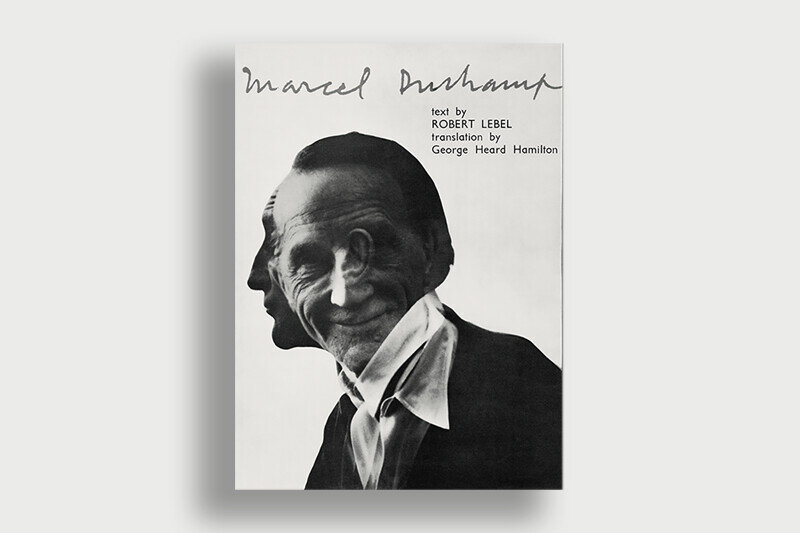Resources
ABOUT US / SERVICES / OUR CLIENTS / STORE / CONTACT
Hauser & Wirth Publishers to release 'Marcel Duchamp' monograph and catalogue raisonné more than 60 years since original edition
After being out of print for more than sixty years, the Grove Press English edition is now back in circulation with Hauser & Wirth Publishers’ fully authorized facsimile of Duchamp’s seminal first monograph and catalogue raisonné.
‘Marcel Duchamp’
Global release date: 8 November 2021
Volume I: Facsimile of the 1959 English edition of ‘Marcel Duchamp’ by Robert Lebel, with texts by Marcel Duchamp, André Breton and H.P. Roché, design and layout by Marcel Duchamp and Arnold Fawcus, hardcover
Volume II: Supplement, edited by Jean-Jacques Lebel & Association Marcel Duchamp, with texts by Jean-Jacques Lebel, Robert Lebel, Man Ray and Michael Taylor; foreword by Harald Falckenberg and an introduction by Michaela Unterdörfer, design and production by fluid, softcover
£100 / $125 / €110 / CHF 120
'Marcel Duchamp' became the go-to book on the legendary artist for many decades following its publication in late 1959, when editions in French and English were simultaneously released. After being out of print for more than sixty years, the Grove Press English edition is now back in circulation with Hauser & Wirth Publishers’ fully authorized facsimile of Duchamp’s seminal first monograph and catalogue raisonné.
This iconic title is the culmination of many years of Duchamp’s collaboration with its author, art historian and critic Robert Lebel. To this day, the book’s texts, which include chapters authored by Duchamp, H.P. Roché, and André Breton, remain just as relevant and impactful, as does Duchamp’s book design. Hauser & Wirth Publishers reanimate 'Marcel Duchamp' with its faithful reproduction of the 1959 Grove Press edition alongside Jean-Jacques Lebel, Robert Lebel’s son, and Association Marcel Duchamp, representing the artist’s estate.
The facsimile of the historic edition is presented in a slipcase with a supplement edited by Jean-Jacques Lebel and Association Marcel Duchamp. The supplement features texts and archival material that stitch together the story of Duchamp and Lebel’s close collaboration and, as contributor Michael Taylor writes, how the original publication signified a ‘sea change in the artist’s receptivity to critical interpretation.’
About the project
Over the past decade, Jean-Jacques Lebel and Association Marcel Duchamp, pursued a passion to reprint 'Marcel Duchamp'. The prominent title introduced the revolutionary artist to English speaking audiences in the late 1950s and remains a vital point of reference for understanding Duchamp’s oeuvre, his wholly unique ideas and inner circle of artistic peers. Since 2018, Hauser & Wirth Publishers has been working alongside Lebel and Association Marcel Duchamp to realise the 2021 reedition, a testament to the trust bestowed on the imprint to see the project through to fruition. Re-creating a title that was fabricated more than 60 years ago required specialists; fluid, the curatorial-design studio helped by art historians and book specialists Axel Heil and Margrit Brehm, led this effort. They re-recreated the original typefaces as digital fonts, positioning each letter and image exactly where they were in the original. Paper conservators and printers were consulted, and together, the collaborative team worked to produce a facsimile that matches the edition that Duchamp personally signed off on in 1959, whilst working with contemporary printing tools.
Since Duchamp’s death in 1968, his legacy and influence has continued to grow and inspire new generations of artists. Hauser & Wirth Publishers specialises in lived art histories, and 'Marcel Duchamp' is considered the authoritative progenitor of this series. The reedition of 'Marcel Duchamp' brings readers closer to the lived experience and creative process of one of the most influential artists of the 20th century. Re-examining the artist-led publication more than a half-century after its original release is an indispensable feature of this project. The supplement features a roster of texts that explore the relationship between Duchamp and Robert Lebel, considering the critical reception of the book, and extending the narrative of Duchamp’s community, life, and work that began in the monograph.



